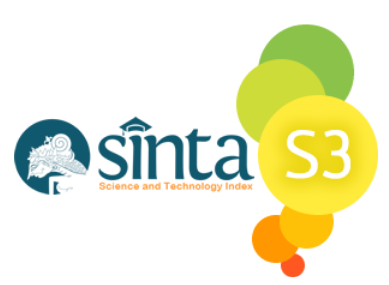DEVELOPING BUSINESS ENGLISH MODULE BASED ON OUTCOME BASED LEARNING APPROACH
Abstract
This research aimed to develop an English module for Business Administration Department students. This research is a research and development or Research and Development. The learning product that will be developed is an English learning module to improve student competence with an outcome-based education approach. The trial product was then evaluated by several parties, including expert and lecturers. Based on the results of the group test, there is an effect of developing students' English skills using the English for Business Administration module with those who do not use the module. And after a comparison test was carried out between class A and class B (experimental class) it was found that the English language skills of business administration students were better, both in terms of reading and vocabulary, listening comprehension, writing skills and speaking fluency. Thus, the English for Business Administration module is able to overcome the problems that have been faced by business administration students in terms of mastering business administration English.
Keywords
Full Text:
PDFReferences
Alwasilah, C. (2008). Filsafat Bahasa dan Pendidikan. Bandung: Remaja Rosdakarya
Bialystok, E. (1991). Language Processing in Bilingual Children. Cambridge, New York: Cambridge University Press.
Bogdan, R.C. & Biklen, S.K. (1982). Qualitative Research for Education: An Introduction to Theory and Methods. Boston: Allyn and Bacon, Inc.
Bishop, W. (1997). Teaching Lives: Essays and Stories. Utah: Utah State University Press
Borders, L.D & Brown, L.L. (2005). The New Handbook of Counseling Supervision. New York: Taylor & Francis Group
Butcher, C. et al. (2006). Designing Learning: From Module Outline to Effective Teaching. London and New York: Routledge
Cummings, L. (2007). Pragmatik; Sebuah Perspektif Multidisipliner. Translated by Abd. Syukur Ibrahim. Yogyakarta: Pustaka Pelajar.
Coulthard, M. & Johnson, A. (2007). An Introduction to Forensic Linguistic, Language in Evidence. New York: Routledge Taylor & Francis Group.
CTI. 2017. Wawancara Investigatif untuk Perkara Pidana. Alat Bantu Pelatihan CTI1. CTi.org. November 2017.
Davis, H.A. (2003). Conceptualizing the role and influence of student-teacher relationships on children's social and cognitive development. Educational Psychologist, 38(4), 207-234.
Desmond, C.T. (1996). Shaping the Culture of Schooling: The Rise of Outcome-Based Education. New York: SUNY Press
Dick, W., Carey, L., & Carey, J.O. (2009). The systematic design of instruction 7th Ed. United State of America: Pearson Education
Dresang, E.T., et al. (2006). Dynamic Youth Services Through Outcome- Based Planning and Evaluation. Chicago: American Library Association
Eggert, L.L., et al. (1995). Reconnecting Youth: A Peer Group Approach to Building Life Skills. London: National Educational Service
Emzir. (2011). Metodologi Penelitian Kualitatif Analisis Data. Jakarta. Rajawali Pers.
Gabler, I.C. & Schroeder, M. (2013). Seven Constructivist Methods for the Secondary Classroom: A Planning Guide for Invisible Teaching. New York: Allyn and Bacon
Glynn, L.G. (2006). Helping Each Other to Learn: A Process Evaluation of Peer Assisted Learning. BMC, Medical Education, 2006, Vol. 6(19), DOI: http:// https://dx.doi.org/10.1186%2F1472-6920-6-18
Gross, M., Mediavilla, C., & Walter, V.A. (2016). Five Steps of Outcome-Based Planning and Evaluation for Public Libraries. Chicago: American Library Association
Jansen, J.D. & Christie, P. (1999). Changing Curriculum: Studies on Outcomes-based Education in South Africa. Kenwyn: Juta and Company Ltd
Jones, J.E., Baran, M.L., & Cosgrove, P.B. (2018). Outcome-Based Strategies for Adult Learning. Pennsylvania: IGI Global
Kemmis, S., McTaggart, R., & Nixon, R. (2014). The Action Research Planner: Doing Critical Participatory Action Research. New York: Springer
Kemmis, S. & McTaggart, R. (2005). Participatory Action Research: Communicative Action and the Public Sphere. In N. Denzin & Y. Lincoln (Eds.), Handbook of Qualitative Research (3rd ed., Chap. 23, pp. 559–604). Thousand Oaks: Sage
Killen, R. (2007). Teaching Strategies for Outcomes-based Education. Kenwyn: Juta and Company Ltd
Kumpulainen, K. & Wray, D. (2002). Classroom Interactions and Social Learning: From Theory to Practice. London: Routledge
Larsen-Freeman, D. & Long, M.H. (1991). An Introduction to Second Language Acquisition Research. London: Longman.
Liliweri, A. (1994). Komunikasi Verbal dan Nonverbal. Bandung: PT Citra Aditya Bakti.
Lindsey, R.G., Westphal, Jr., C. & Jew, C. (2008). Culturally Proficient Inquiry: A Lens for Identifying and Examining Educational Gaps. California: Corwin Press
Ludvik, M. & Bresciani, J. (2018). Outcomes-Based Program Review: Closing Achievement Gaps In and Outside the Classroom With Alignment to Predictive Analytics and Performance Metrics. Virginia: Stylus Publishing, LLC.
Miles, M.B. & Huberman. (2007). Analisis Data Kualitatif. Translated by Tjeptjep Rohidi. Jakarta: Universitas Indonesia Press.
Olsson, J. (2008). Forensic Linguistics: second Edition. London: Continuum International Publishing Company.
Sivakumar, A. & Thirumoorthy, G. (2018). Educational Psychology. India: Laxmi Book Publication
Sugiyono. (2009). Metode Penelitian Kuantitatif Kualitatif dan R&D. Bandung: Alfabeta.
DOI: https://doi.org/10.18551/erudio.9-1.2
Refbacks
- There are currently no refbacks.
Copyright (c) 2022 Erudio Journal of Educational Innovation

This work is licensed under a Creative Commons Attribution 4.0 International License.












